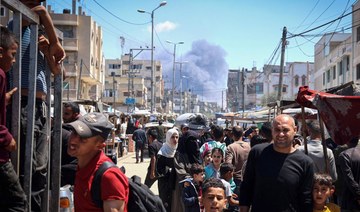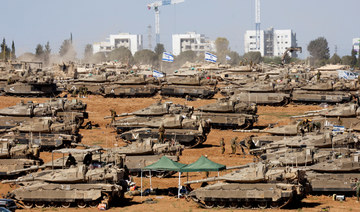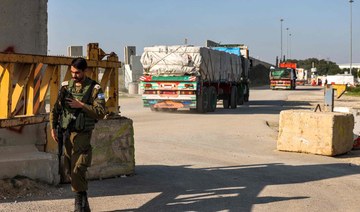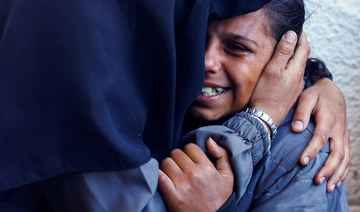GAZA STRIP: Hamas released the first batch of hostages under a cease-fire deal that began Friday, including 13 Israelis who have been held in the Gaza Strip since the militant group staged a raid on Israel nearly seven weeks ago, according to officials and media reports.
Twelve Thai nationals were also released, according to Thai Prime Minister Srettha Thavisin. Dozens of Palestinian prisoners are also expected to be freed by Israel.
The cease-fire between Israel and Hamas began Friday, setting the stage for the exchange and allowing sorely needed aid to start flowing into Gaza.
There were no reports of fighting after the truce began. The deal offered some relief for Gaza’s 2.3 million people, who have endured weeks of Israeli bombardment and dwindling supplies of basic necessities, as well as for families in Israel worried about loved ones taken captive during Hamas’ Oct. 7 attack, which triggered the war.
The truce raised hopes of eventually winding down the conflict, which has flattened vast swaths of Gaza, fueled a surge of violence in the occupied West Bank and stirred fears of a wider conflagration across the Middle East. Israel, however, has said it is determined to resume its massive offensive once the cease-fire ends.
Under the deal, Gaza’s ruling Hamas group pledged to free at least 50 of the about 240 hostages it and other militants took in the Oct. 7 raid. In exchange, Hamas said Israel would free 150 Palestinian prisoners.
Both sides agreed to release women and children first, in stages starting Friday, and as planned 13 Israelis were released, according to Israeli media, citing security officials. An Israeli official, meanwhile, confirmed that the Thai captives left Gaza and were en route to a hospital in Israel. The official spoke on condition of anonymity because she was not authorized to discuss the releases with the media.
Israel said the deal calls for the truce to be extended an extra day for every additional 10 hostages freed.
Early in the day, ambulances were seen arriving at the Hatzerim air base in southern Israel, preparing for the release. Those freed will then be taken to hospitals for assessment and treatment, Israeli officials said.
Among the Israeli citizens freed some have a second nationality, according to a Hamas official who spoke on condition of anonymity because he was not authorized to discuss the details with the media.
Israel’s Justice Ministry published a list of 300 Palestinian prisoners eligible for release. Thirty-nine — 24 women, including some convicted of attempted murder for attacks on Israeli forces, and 15 teenagers jailed for offenses like throwing stones — were expected to be freed Friday, Palestinian authorities said.
On Friday, the truce brought quiet after weeks in which Gaza saw heavy bombardment and artillery fire daily as well as street fighting as ground troops advanced through neighborhoods in the north. The last report of air raid sirens in Israeli towns near the territory came shortly after the truce took effect.
Not long after, four tankers with fuel and four with cooking gas entered the Gaza Strip from Egypt, Israel said.
Israel has agreed to allow the delivery of 130,000 liters (34,340 gallons) of fuel per day during the truce — still only a small portion of Gaza’s estimated daily needs of more than 1 million liters.
For most of the past seven weeks of war, Israel had barred the entry of fuel to Gaza, claiming it could be used by Hamas for military purposes — though it has occasionally allowed small amounts in.
UN aid agencies pushed back against the claim, saying fuel deliveries were closely supervised and urgently needed to avert a humanitarian catastrophe since fuel is required to run generators that power water treatment facilities, hospitals and other critical infrastructure.
The Israeli military dropped leaflets over southern Gaza, warning hundreds of thousands of displaced Palestinians who sought refuge there not to return to their homes in the territory’s north, the focus of Israel’s ground offensive.
Even though Israel warned that it would block such attempts, hundreds of Palestinians could be seen walking north Friday.
Two were shot and killed by Israeli troops and another 11 were wounded. An Associated Press journalist saw the two bodies and the wounded as they arrived at a hospital.
Sofian Abu Amer, who had fled Gaza City, said he decided to risk heading north to check on his home.
“We don’t have enough clothes, food and drinks,” he said. ”The situation is disastrous. It’s better for a person to die.”
The hope is that “momentum” from the deal will lead to an “end to this violence,” said Majed Al-Ansari, a spokesman for the Foreign Ministry of Qatar, which served as a mediator along with the United States and Egypt.
But hours before it came into effect, Israeli Defense Minister Yoav Gallant was quoted telling troops that their respite would be short and that the war would resume with intensity for at least two more months.
Prime Minister Benjamin Netanyahu has also vowed to continue the war to destroy Hamas’ military capabilities, end its 16-year rule in Gaza and return all the hostages.
Israel’s northern border with Lebanon was also quiet on Friday, a day after the militant Hezbollah group, an ally of Hamas, carried out the highest number of attacks in one day since fighting there began Oct. 8.
Hezbollah is not a party to the cease-fire agreement, but was widely expected to halt its attacks.
The war erupted when several thousand Hamas militants stormed into southern Israel, killing at least 1,200 people, mostly civilians, and taking scores of hostages, including babies, women and older adults, as well as soldiers.
The soldiers will only be released in exchange for all Palestinians imprisoned by Israel, according to the Islamic Jihad militant group, which is reportedly holding about 40 hostages.
It is not clear how many of the hostages are currently serving in the military or whether the militants also consider reserve soldiers to be “military hostages.”
According to the Palestinian Prisoners’ Club, an advocacy group, Israel is currently holding 7,200 Palestinians on security charges or convictions, including about 2,000 arrested since the start of the war.
The Israeli offensive has killed more than 13,300 Palestinians, according to the Health Ministry in Hamas-ruled Gaza, which resumed its detailed count of casualties in Gaza after stopping for weeks because of the health system’s collapse in the north.
The ministry says some 6,000 people have been reported missing, feared buried under rubble.
The ministry does not differentiate between civilians and militants in its death tolls. Women and minors have consistently made up around two-thirds of the dead, though the new number was not broken down. The figure does not include updated numbers from hospitals in the north.
Israel says it has killed thousands of Hamas fighters, without presenting evidence for its count.
Hamas frees first batch of hostages under truce, including 13 Israelis
https://arab.news/w7rr2
Hamas frees first batch of hostages under truce, including 13 Israelis

- Pause silences guns raging since Hamas’ raids into Israel on October 7
- 13 hostages held in Gaza freed, Israel to release 39 Palestinians prisoners
South Gaza hospitals have only three days’ fuel left: WHO

- Despite international objections, Israel sent tanks into the overcrowded southern city of Rafah on Tuesday and seized the nearby crossing into Egypt
- “Hospitals in the south of Gaza only have three days of fuel left, which means services may soon come to a halt,” WHO chief said
GENEVA: Hospitals in the southern Gaza Strip have only three days of fuel left, the head of the World Health Organization said Wednesday, due to closed border crossings.
Despite international objections, Israel sent tanks into the overcrowded southern city of Rafah on Tuesday and seized the nearby crossing into Egypt that is the main conduit for aid into the besieged Palestinian territory.
“The closure of the border crossing continues to prevent the UN from bringing fuel. Without fuel all humanitarian operations will stop. Border closures are also impeding delivery of humanitarian aid into Gaza,” WHO Director General Tedros Adhanom Ghebreyesus said on X, formerly Twitter.
“Hospitals in the south of Gaza only have three days of fuel left, which means services may soon come to a halt.”
Tedros said Al-Najjar, one of the three hospitals in Rafah, was no longer functioning due to the ongoing hostilities in the vicinity and the military operation in Rafah.
“At a time when fragile humanitarian operations urgently require expansion, the Rafah military operation is further limiting our ability to reach thousands of people who have been living in dire conditions without adequate food, sanitation, health services and security,” he said.
“This must stop now.”
The Geneva-based WHO is the UN’s health agency.
Israel bombarded Rafah on Wednesday as talks resumed in Cairo aimed at agreeing the terms of a truce in the seven-month war.
Gaza’s bloodiest-ever war began following Hamas’s unprecedented October 7 attack on Israel that resulted in the deaths of more than 1,170 people, mostly civilians, according to an AFP tally of Israeli official figures.
Vowing to destroy Hamas, Israel has conducted a retaliatory offensive that has killed more than 34,800 people in Gaza, mostly women and children, according to the Hamas-run territory’s health ministry.
Egypt police probe murder of Israeli-Canadian businessman
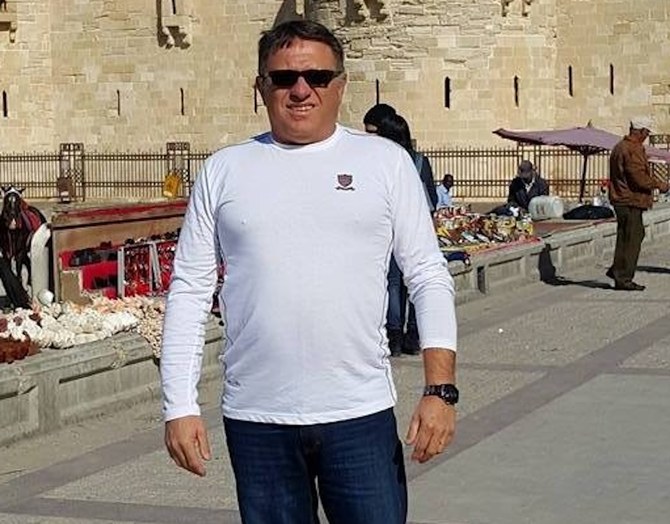
- Security sources made no link between the shooting and the dead man’s ethnic background
CAIRO: Egypt’s interior ministry said it had launched an investigation Wednesday after an Israeli-Canadian businessman was shot dead in the coastal city of Alexandria.
A police statement said the man, “a permanent resident of the country” was shot dead on Tuesday.
The Israeli foreign ministry said the murdered man was a businessman with dual Canadian-Israeli citizenship.
“He had a business in Egypt. The Israeli embassy in Cairo is in contact with the Egyptian authorities, who are investigating the circumstances of the case,” the ministry said.
Attacks on Israelis in Egypt are rare but not unprecedented.
On October 8, the day after Hamas attacked Israel triggering war in Gaza, an Egyptian policeman shot dead two Israeli tourists and their Egyptian guide.
Following their deaths, Israeli authorities advised its nationals in Egypt to leave “as soon as possible.”
Egypt was the first Arab country to sign a peace treaty with Israel but relations between the two peoples have never been warm.
The Egyptian government has often acted as mediator in flare-ups in the Israeli-Palestinian conflict that have threatened to stir up passions on the street.
Israel pounds Gaza as truce talks resume in Cairo
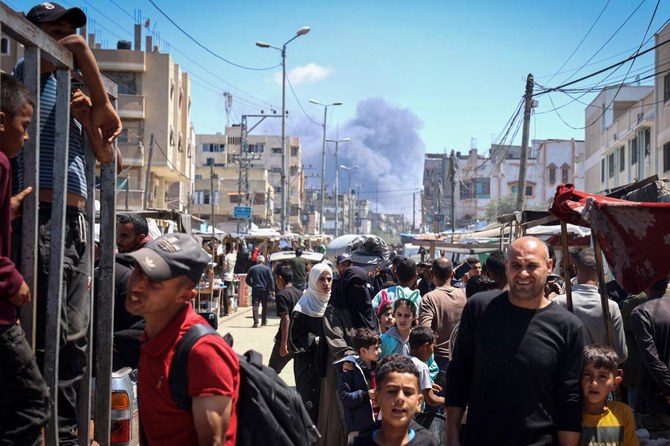
- AlQahera News: ‘Truce negotiations have resumed in Cairo today with all sides present’
- Moscow so far sees no prospect for a peace settlement in Gaza or the wider Middle East
RAFAH, Palestinian Territories: Israel bombarded the overcrowded Gaza city of Rafah, where it has launched a ground incursion, as talks resumed Wednesday in Cairo aimed at agreeing the terms of a truce in the seven-month war.
Despite international objections, Israel sent tanks into Rafah on Tuesday and seized the nearby crossing into Egypt that is the main conduit for aid into the besieged Palestinian territory.
The White House condemned the interruption to humanitarian deliveries, with a senior US official later revealing Washington had paused a shipment of bombs last week after Israel failed to address US concerns over its Rafah plans.
The Israeli military said hours later it was reopening another major aid crossing into Gaza, Kerem Shalom, as well as the Erez crossing.
But the UN agency for Palestinian refugees, UNRWA, said the Kerem Shalom crossing — which Israel shut after a rocket attack killed four soldiers on Sunday — remained closed.
It came after a night of heavy Israeli strikes and shelling across Gaza. AFPTV footage showed Palestinians scrambling in the dark to pull survivors, bloodied and caked in dust, out from under the rubble of a Rafah building.
Russia said on Wednesday that the war in Gaza was escalating due to Israel’s incursion into Rafah and that Moscow so far saw no prospect for a peace settlement in Gaza or the wider Middle East.
“An additional destabilizing factor, including for the entire region, was the launch of an Israeli military ground operation in Rafah,” Russian Foreign Ministry Spokeswoman Maria Zakharova told reporters.
“About one and a half million Palestinian civilians are concentrated there. In this regard, we demand strict compliance with the provisions of international humanitarian law.”
Speaking more broadly about efforts to find a lasting settlement in the Middle East, Zakharova said: “I would like to call it a settlement, but, alas, it is far from a settlement.”
“There are no prospects for resolving the situation in the Gaza Strip. On the contrary, the situation in the conflict zone is escalating daily.”
“We are living in Rafah in extreme fear and endless anxiety as the occupation army keeps firing artillery shells indiscriminately,” said Muhanad Ahmad Qishta, 29.
“Rafah is a witnessing a very large displacement, as places the Israeli army claims to be safe are also being bombed,” he said.
The Gaza war was sparked by Hamas’s unprecedented October 7 attack on Israel, which resulted in the deaths of more than 1,170 people, mostly civilians, according to an AFP tally of Israeli official figures.
Israel in response vowed to crush Hamas and launched a military offensive that has killed at least 34,789 people in Gaza, mostly women and children, according to the Hamas-run territory’s health ministry.
Militants also took around 250 people hostage, of whom Israel estimates 128 remain in Gaza, including 36 who are believed to be dead.
Talks aimed at agreeing a ceasefire resumed in Cairo on Wednesday “in the presence of all parties,” Egyptian media reported.
A senior Hamas official said the latest round of negotiations would be “decisive.”
“The resistance insists on the rightful demands of its people and will not give up any of our people’s rights,” he said on condition of anonymity because he was not authorized to speak publicly on the negotiations.
The official had previously warned it would be Israel’s “last chance” to free the scores of hostages still in militants’ hands.
Mediators have failed to broker a new truce since a week-long ceasefire in November saw 105 hostages freed, the Israelis among them in exchange for Palestinian prisoners held by Israel.
Mediator Qatar urges international community to prevent Rafah ‘genocide’
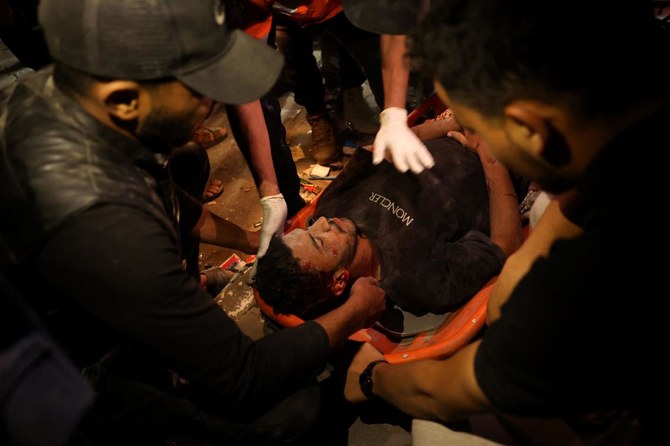
- Israel struck targets in the Gaza Strip on Wednesday after seizing the main border crossing with Egypt
- African Union condemns the Israeli military’s moves into southern Gaza’s Rafah
DOHA: Qatar called on the international community on Wednesday to prevent a “genocide” in Rafah following Israel’s seizure of the Gaza city’s crossing with Egypt and threats of a wider assault.
In a statement the Gulf state, which has been mediating between Israel and militant group Hamas, appealed “for urgent international action to prevent the city from being invaded and a crime of genocide being committed.”
Israel struck targets in the Gaza Strip on Wednesday after seizing the main border crossing with Egypt. Israel has vowed for weeks to launch a ground incursion into Rafah, despite a clamour of international objection.
The attacks on the southern city, which is packed with displaced civilians, came as negotiators and mediators met in Cairo to try to hammer out a hostage-release and truce deal in the seven-month war.
Qatar, which has hosted Hamas’s political office in Doha since 2012, has been engaged — along with Egypt and the United States — in months of behind-the-scenes mediation between Israel and the Palestinian group.
The African Union condemned Wednesday the Israeli military’s moves into southern Gaza’s Rafah, calling for the international community to stop “this deadly escalation” of the war.
AU Commission chief Moussa Faki Mahamat “firmly condemns the extension of this war to the Rafah crossing,” said a statement after Israeli tanks captured the key corridor for humanitarian aid into the besieged Palestinian territory.
Faki “expresses his extreme concern at the war undertaken by Israel in Gaza which results, at every moment, in massive deaths and systematic destruction of the conditions of human life,” the statement said.
“He calls on the entire international community to effectively coordinate collective action to stop this deadly escalation.”
Israel says it has reopened Kerem Shalom border crossing for Gaza aid
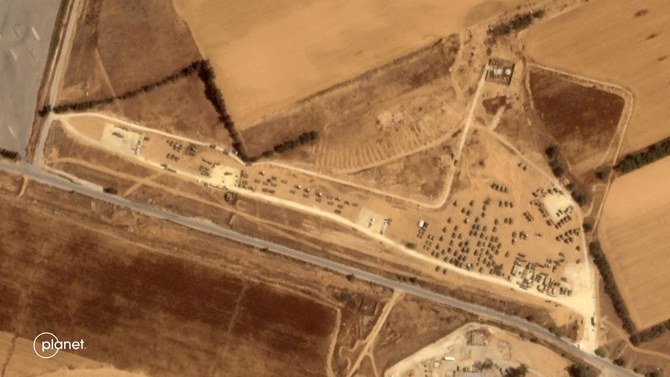
- Erez border crossing between Israel and northern Gaza is also open for aid deliveries into the Palestinian territory
JERUSALEM: Israel said it reopened the Kerem Shalom border crossing to humanitarian aid for Gaza Wednesday, four days after closing it in response to a rocket attack that killed four soldiers.
“Trucks from Egypt carrying humanitarian aid, including food, water, shelter equipment, medicine and medical equipment donated by the international community are already arriving at the crossing,” the army said in a joint statement with COGAT, the defense ministry body that oversees Palestinian civil affairs.
The supplies will be transferred to the Gaza side of the crossing after undergoing inspection, it added.
The statement said the Erez border crossing between Israel and northern Gaza is also open for aid deliveries into the Palestinian territory.
The Kerem Shalom crossing was closed after a Hamas rocket attack killed four soldiers and wounded more than a dozen on Sunday.
On Tuesday, Israeli troops seized control of the Palestinian side of the Rafah crossing between Gaza and Egypt after launching an incursion into the eastern sector of the city.
The United Nations and Israel’s staunchest ally the United States both condemned the closure of the two crossings which are a lifeline for civilians facing looming famine.



